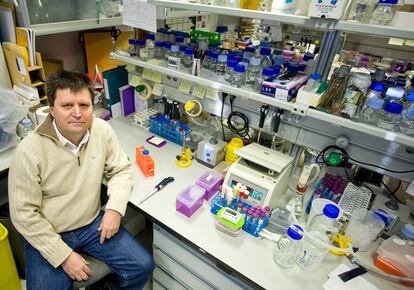Andrés Aguilera, professor of genetics at the University of Seville.US
A simplified explanation of cancer is that it involves the development of abnormal cells that divide, grow, and spread uncontrollably. Cell division is a natural biological mechanism, but any failure in the process of replication and transcription of genetic material can cause the cell, instead of dying naturally, to begin dividing without limit, forming masses, called tumors or neoplasms. that end up destroying and replacing normal tissues. An investigation of the University of Seville (US) in the Andalusian Center for Molecular Biology and Regenerative Medicine (CABIMER), published in
Nature Genetics
, has identified the mechanism of one of the most frequent mutations (changes in the natural sequence of DNA) in tumors, a fundamental finding for understanding carcinogenic processes and seeking solutions.
If cell replication were like copying a book, the DNA would be the letters, which must be placed exactly the same in a new copy for the message to be correct and the copy to fulfill its function.
Some genes act as tumor suppressors, such as P53, and are responsible for producing proteins that monitor and control transcription and replication processes.
A change (mutation) in these genes can cause them to not fulfill their function and start uncontrolled cell division.
More information
A gold and sugar ink essential to treat cancer
Alterations in P53, known as the "guardian of the genome", are the most common detected in tumors. But there is another group whose mutation mechanism has been discovered by Spanish researchers and which gives rise to the second most frequent mutation in cancers.
This new mechanism, whose role was not clear until recently published research, begins in a complex of proteins, known as chromatin SWI / SNF (
SwItch / Sucrose Non Fermentable),
which has the function of
remodeling
and
accommodating
the DNA envelope (histones) to allow gene expression or genome replication.
In this process of acting on the DNA envelope, the Brahma-related gene-1 (BRG1), a component of chromatin and a critical modulator to regulate transcription, repair and genetic recombination in cellular processes, plays a fundamental role.
The SWI / SNF remodeler is like a guard on a track with two trains traveling in the opposite direction.
If you don't regulate traffic, a catastrophe occurs
Andrés Aguilera, professor of genetics at the University of Seville
Without these elements, the replication and transcription processes
collide
and the instability that characterizes tumors is generated.
The professor of genetics at the University of Seville Andrés Aguilera, director of the study, whose main author is Aleix Bayona-Feliu, simplifies it to explain it.
“The SWI / SNF remodeler is like a guard on a track where two trains travel in the opposite direction.
If you don't regulate traffic, a catastrophe occurs ”.
In this way, any alteration in the SWI / SNF complex, vigilant of this traffic, generates genetic instability, which is behind most tumors.
"The SWI / SNF complex is necessary for cells to resolve the conflicts that occur in the chromosomes when the transcription and replication machines collide in the same place, impeding each other," explains Aguilera.
An initial mutation occurs accidentally and, if it affects the police that regulates DNA trafficking, in this case SWI / SNF, or cell division, the cell loses control over the integrity of the genome and the cascade of genetic alterations begins.
Andrés Aguilera, professor of genetics at the University of Seville
The result of the failure caused by mutations in the SWI / SNF complex is the generation and accumulation of hybrid DNA and RNA molecules that are toxic and that researchers believe are frequently present in tumors. According to the study, "the impact of SWI / SNF alterations could explain the prevalence of their mutations in human malignancies and why the factors of this complex are more widely mutated than any other tumor suppressor or oncogene."
Aguilera explains: “An initial mutation occurs accidentally and, if it affects the
police
that regulates trafficking in DNA, in this case SWI / SNF, or cell division, the cell loses control over the integrity of the genome and begins the cascade of genetic alterations that can lead to cancer.
Identifying this mutation in its early stages would make it possible to establish a biomarker in very early stages of cancer and, in the future, be used in prevention and personalized therapies ”.
Andrés Aguilera, in the laboratory.US
Hao Zhu, a researcher at the Children's Medical Center Research Institute at UT Southwestern Hospital (Texas), and the author of another study on chromatin published in
Nature cancer,
agrees that the SWI / SNF chromatin complexes play a crucial role in the development of normal tissues and, when altered, can lead to the development of cancer: “These complexes are commonly altered by mutations in the genes that encode them, but they are he knows little about how this leads to the tumor. While it is very clear that SWI / SNF components are defective in almost all cancers, there is still confusion about how mutations in the components lead to disease. "
For Zachary Mandell, author of a study published in
eLife
on the gene transcription cycle, "this process is very coordinated in order to ensure that the correct genes are expressed at the correct times and levels for the cell to function properly."
"We are interested in understanding the mechanisms that allow the cell to stop transcription at precise places throughout the genome," he says.
You can follow
MATERIA
on
,
and
, or sign up here to receive
our weekly newsletter
.

